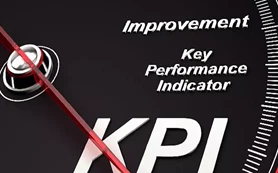
How to become a successful CFO
Not all Chief Financial Officers (CFOs) are created equal – some are more effective than others at determining and leading the strategic direction of a business.
CFO duties and responsibilities vary; everyone is different, and everyone brings their unique blend of skills and experience to the role. So, what makes a CFO successful?
In this article, we examine the common traits shared by successful CFOs and the key elements and skills that will add to CFO effectiveness.
 5 minutes
5 minutes
Written by Steve Thomas, Finance Software and Systems Specialist
What makes a successful CFO?
According to Gartner's 2022 survey of over 100 CFOs, only 1 in 5 CFOs exceed their Chief Executive Officer’s (CEO’s) expectations for contributing to short-term performance and promoting company behaviours leading to long-term growth.
Gartner’s survey found that the skills and behaviours of successful CFOs can be acquired over time. They also found that several attributes don’t contribute to the effectiveness of a CFO. These include:
- Personal traits – such as age, gender, and background.
- Company traits – such as revenue size and public or private ownership.
- Finance direct reports – and their capabilities to take on projects typically outside finance scope.
- Time within the Finance function – including finance talent initiatives.
- C-suite relationships – including the Chief Information Officer (CIO), Chief Human Resources Officer (CHRO) or legal counsel.
- Personal ownership of initiatives – such as mergers and acquisitions, cost management, or digital business transformation.
So, if these attributes don’t contribute to the effectiveness and, therefore, the success of a CFO, what does?
Diplomatic and collaborative:
The most successful CFOs are recognised as vital strategic partners. The CFO must work effectively with the CEO, other board members and numerous heads of department. The ability to listen to, understand and take account of multiple priorities and perspectives from different stakeholders are key skills that take patience and insight to learn.
Ability to see the big picture:
An effective CFO understands how a business's different elements work together. They can spot a trend, get to the bottom of issues, and get to grips with a new commercial idea. Simply knowing the numbers isn’t enough.
Comfortable with calculated risk:
When evaluating an opportunity, it shouldn’t just be about whether it makes good commercial sense. Is it the right opportunity to deliver long-term growth? Does it position the business well for the future and meet the CEO’s financial performance expectations? A successful CFO will not only understand how a business idea makes financial sense, but they will also assess the many other factors that make an opportunity right (or wrong) for a business and weigh these up. This is important because sometimes playing it too safe can be just as risky as committing to a new venture.

5 Top tips on how to become a successful CFO
There are many ways that a CFO can improve their performance and become successful within their business and industry. We have identified the top 5 areas you can focus on initially to get ahead and become a successful CFO.
1. Discover hidden opportunities
There’s no shortage of data these days, but it is of little use without the analytical tools, models and dashboards to leverage true insight. Every successful CFO knows that it’s the story behind the data that counts – and that the integration and automation of transactional tasks and strategic finance tools are fundamental to making this work.
Data warehousing and digital analysis tools remove the work required to assemble models and keep them up to date and validated. This leaves more time to refine the forecast or, for example, to make the best, most likely, and worst-case scenarios. By building scenarios and testing them out, the CFO can take a more strategic view of the business.
Integrating systems to aggregate data from around the business allows for more intelligent analysis and reporting. Building meaningful narratives around the numbers creates a powerful opportunity for the CFO.
Visual dashboards that ‘show’ instead of ‘tell’ make it easier to look at sales and profit from different perspectives or make wise investment decisions. CFOs who push out role-specific dashboards to managers across the business also increase the likelihood that others will spot opportunities to feed into the bigger plan.
Democratising data in this way also safeguards because problems can be raised before they become more significant. The best CFOs will actively engage experts within the business because they understand that this is a more efficient way to connect the dots and see the whole picture.
2. Use technology as an aid
The successful CFO will set aside time to look at how the business could run better and more productively and most likely will leverage technology to discover opportunities to achieve this and to bring in more profit.
But one of the most valuable ways for a CFO to utilise technology is to become a master of predictive analytics.
Too many CFOs continue to rely heavily on their ‘gut feeling’ rather than digging deep into the available hard data. Now that tools are widely available to crunch through vast volumes of data and manipulate multiple data formats, it makes sense to back up that gut feeling with some facts and figures too.
Predictive scenarios can be extremely powerful, as can the ability to delve into the business data pool and discover new opportunities.
Find out how our Finance Software can help with your strategic decisions.
3. Develop leadership skills
“Getting to CFO is 80% functional/technical and 20% leadership skills. Once in the CFO chair, this equation is turned on its head.” - Brian MacDonald, ex-CEO, The Hertz Corporation.
The International Executive Development Programme Developing Leaders (IEDP) identifies three critical CFO success factors, developed through consultation with leading CFOs, CEOs and audit chairs, described as the Three Pillars of CFO Leadership™:
- Leadership in the C-Suite: Developing self-mastery, communication and influencing skills, problem-solving and decision-making skills, and demonstrating leadership.
- Strategic Agility and Business Acumen: Becoming a valued business partner to the CEO, using big picture thinking, understanding client and stakeholder needs, and developing competitive advantage.
- Managing Key Stakeholder Relations: Shaping the relationships that determine success, including managing board relationships, dealing with the external financial community, and managing auditors and regulators.
These skills can be developed through training and practice - you can read more about how to develop the 7 Essential Skills for a CFO in our blog.
4. Take a strategic approach
A strategic approach enables you to take a step back from the day-to-day operations and look at your organisation as a whole - what you want your organisation to do, where you want it to be and where you’d like it to go.
Strategic thinking skills can significantly impact your business’s direction, overcome challenges and achieve business objectives. Therefore, developing a strategic thinking approach can be a major advantage in becoming a successful CFO.
Strategic thinking skills include:
- Analytical skills – the capability to analyse a variety of inputs—from financial statements and KPIs to business trends and internal reports.
- Communication skills – communicating complex ideas, collaborating with stakeholders, gaining buy-in, and ensuring everyone aligns with the organisation’s strategic goals.
- Problem-solving skills - implementing a strategy requires you first to analyse the problem and develop potential solutions. From there, you can craft a plan that solves it. Therefore, problem-solving skills are a must-have ability for strategic thinking.
- Planning and management skills – after defining the strategy, you need to implement it, which requires strong planning and management skills to determine and deliver a plan.
Download our Strategic CFO whitepaper, where we look at some of the critical problems holding CFOs and finance directors back and what they can do to become more strategic.
5. Use business intelligence
Business intelligence is the combination of processes and technologies that enables data analysis, data management and data visualisation so that business data is presented in user-friendly formats such as reports, dashboards, charts and graphs.
Successful CFOs use business intelligence to their advantage to gain detailed insights into the performance of a business to develop strategies to grow the business, operate more efficiently, and increase competitive advantage.
Real-time information can help you make more effective and informed business decisions based on actual data rather than gut feel. As such, you will be able to adapt to market and economic changes swiftly and efficiently and spot opportunities and problems as and when they arise.
In volatile economic situations, a CFO who utilises business intelligence will enable their business to quickly adjust to change, sustain a competitive advantage, and remain successful in a rapidly changing business environment.
For more information on how business intelligence can help you grow your business and become a more successful CFO, read our blog on business intelligence here.
We have many resources to help you on your journey to succeeding as a strategic CFO and make life a whole lot easier for your staff and your business in our resources hub for strategic CFOs.
Don't let anything hold you back. Use our guide to succeed as a strategic CFO.
How to succeed as a Strategic CFO
Adopting a strategic approach may seem daunting, pick up some tips on what strategic should look like and how you can take your business to the next level.

New CFO checklist: 90-day plan
Learn more about your first 3 months as a new CFO and where to start with our 90-day checklist.

7 essential skills for a CFO
Have a read through the 7 essential skills for a CFO to make a positive and lasting impact in your organisation.

How a CFO can use Business Intelligence
Read how successful CFOs use Business Intelligence to drive company strategy and support finance operations.
Tips to help you lead a finance team
The Strategic CFO needs to deliver strong financial performance, and for this needs a strong finance team to support and align on those goals.

Structuring your finance team: best practices to follow
Understand the considerations and best practices to make when structuring your finance team.

11 KPIs your finance team should monitor
What are KPIs, and why should your finance team track them? Explore the top 11 KPIs your finance team should track and why.

How To Build a Highly Effective Finance Team
Learn how to build a finance team that will support the business’s financial growth, strategy and performance.

How to become a Finance Director
Read the key skills required of a Finance Director and the steps you should take to get there.
How can technology support you as a Strategic CFO
For any organisation to be successful it’s important to be able to identify when it’s time to change your strategy and drive your business forward.

The key signs it's time to change your business strategy
Explore the 3 signs of a poor strategy and how a modern, data-fuelled approach can make a difference.

Key signs it's time to change your accounting system
This webinar discusses the impact of under investment in software, why companies decide to change accounting systems, and how to choose the right supplier

The data-driven future of finance and why CFO's need to embrace it
Take a look at the role and the importance of data to gain a better understanding of the financial health of the business.

Guide to CFO software
Look at the software tools which are of most use to the modern CFO, as well as the latest technology trends to look out for.
